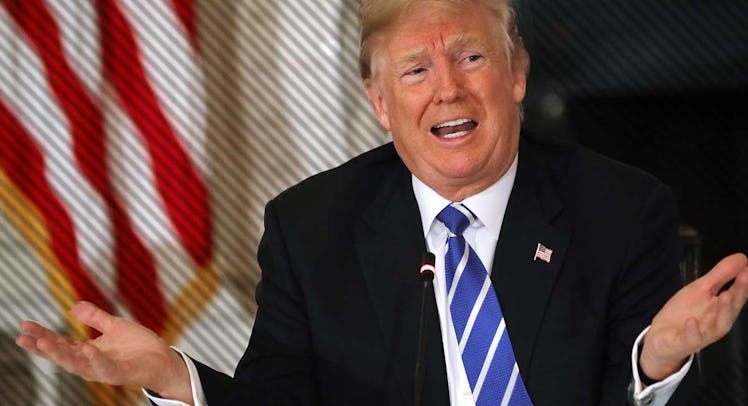Parents Know that Trump’s ‘We’ll See’ is a Bad Tactic in Parenting and Life
POTUS's favorite phrase, "We'll see," scares the crap out of children (also voters).

According to a recent report in the New York Times, journalists who ask any policy questions of President Trump, on either domestic or foreign issues, have a good chance of receiving a two-word answer (no, not that one). Potus has a penchant for saying, “We’ll see” and, seemingly, meaning it. I recognize the appeal of the approach because my two children, who act as our family’s nagging press corps, like most kids, ask a lot of questions and “we’ll see” is an unsatisfying, but effective answer to almost all of them. That said, I know from experience that it’s a deadly phrase, a means for someone with the power to lord it over others while inspiring stress and ire.
Sure, it works over the short term (my kids stop a fight, Korean presidents make nice at the border), but the long-term gets ugly. Why? Because it’s the ultimate hedge. It’s right up there with “maybe” in terms of communicating a complete lack of a plan. It’s an answer that offers absolutely zero resolution while reinforcing a souring power dynamic. It leaves room for hope, which is nice, but it also ends and devalues the conversation.
I spend a lot of time talking to child psychologists. They all tend to circle back to the same point: kids crave structure and certainty. In fact, one of the best ways to turn a child into a nervous wreck is to change their schedule and offer vague answers to concrete questions. This is what our president is now doing to American citizens and it’s not just worrying because of the “stay tuned” impulse at play or the genuine market uncertainty this approach inspires, but because it’s probably the truth. When I say it, I generally am stalling. I don’t know what will happen. I suspect Trump is the same.
It takes a dad to see a dad’s games.
Obviously, Trump isn’t fielding questions like, “Mr. President, can you help me build my new Batman Lego set after dinner?” No, his decisions are far more high stakes. They concern denuclearization on the Korean Peninsula and trade tariffs. Lives literally hang in the balance. Caution, at least publicly, is a good choice. But there’s a difference between caution and diffidence. There’s a difference between saying, “We’re weighing several factors I can enumerate” and saying, “We’ll see.” One at least acknowledges accountability or care.
I know my kids would feel much more stable if I were far more decisive. I know if given real unwavering answers to real questions they might trust me more. I know that I would be more impressed with myself if I spent less time dissembling. All that said, it can be hard. Decisions are hard. And that’s the point. It’s important that people in positions of power acknowledge that fact. It’s important that they communicate not only that a decision will be made, but that it will be made by them in a considered way.
Let’s focus on the phrase. Who is “we”? There’s a sense that no one is in charge. It’s disconcerting and implies a lack of agency on the part of the empowered party, which is bizarre. This is what it sounds like when someone wants to hoard power but remains deeply uncomfortable exercising it. “We’ll see” are the words of a nervous man. I should know. I’m a nervous man.
And maybe that’s what I have in common with President Trump, we’re both a bit daunted by our respective gigs. Again, his is harder and I acknowledge that. However, I do seem to be working a bit more on the whole communication thing. I’m trying to let my people know that decisions are being made with their best interests in mind. I apologize for my vagaries. I want to banish them forever.
Will that happen? We’ll see.
This article was originally published on